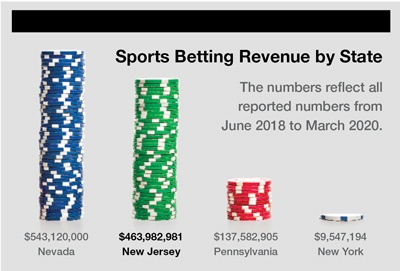
NJ’s Gaming Industry Had Odds in Its Favor Before COVID-19
With casinos forced to close and sports leagues suspended, the future is muddied for the $261-billion industry.
By Jim Pytell, Assistant Editor On May 6, 2020Before COVID-19 exploded across the globe, New Jersey’s gaming industry was building momentum. It was reaping the benefits of online gaming and sports betting as well as bringing new innovative gaming products to market. In the state’s gaming capital, Atlantic City, efforts to diversify the resort’s gaming and non-gaming amenities were contributing to overall growth and renewed interest in the destination.
According to the New Jersey Division of Gaming Enforcement (DGE), total gaming revenue for 2019 from the state’s casinos and sportsbooks at racetracks was $3.5 billion – a 19.5% increase from 2018’s figure of $2.9 billion.
Additionally, casino win in 2019 was $2.7 billion, reflecting a 7% increase over the previous year, while online gaming revenue also increased in 2019 by a whopping 61.6% to $482.7 million, which provided a significant boost to the overall increase in revenue figures.
“Since its launch in 2013, online gaming has been a growing segment of New Jersey’s gaming industry, representing an increasing share of Gross Gaming Revenue (GGR) for operators,” says Rummy Pandit, MBA, LPD, CHA, executive director, Lloyd D. Levenson Institute of Gaming, Hospitality & Tourism, Stockton University. “In 2015, online gaming represented 6% of total annual GGR and in 2019 it represented 14% (including revenue from racetracks). In the first two months of 2020, online gaming represented 18% of total GGR [in New Jersey].”
Pandit says that online gaming platforms don’t just build a singular revenue stream, but they also help engage new customers and build brand loyalty.
“Online customers often enjoy property-based amenities as well by accumulating loyalty rewards. They will often be contributing to additional revenue streams for the property,” he explains. “Online gaming certainly enhances the total gaming experience possibilities.”
Gaming Capital of the US?
Nevada has long been the pinnacle of gaming and entertainment in the United States, with the glitz, glamour and mystique of Las Vegas garnering it worldwide recognition as an entertainment juggernaut. In 2019 alone, Nevada generated more than $12 billion in gaming revenue, so the recognition is certainly deserved.
However, New Jersey has been able to go toe-to-toe with Nevada when it comes to sports betting figures, including surpassing the western state in multiple months in sports betting handle and revenue.
New Jersey’s geographic location, which is lauded as a benefit for nearly all industries, has no doubt aided its sports betting success, as the sheer number of individuals in the region affords a significant advantage.
Interestingly, states with large population epicenters like New York and Pennsylvania have yet to pose a significant threat to New Jersey when it comes to regional supremacy in sports betting.
“Whereas New Jersey has been quick in launching new and innovative gaming products such as online gaming, live dealer games, mobile sports betting, etc., Pennsylvania and New York have somewhat lagged behind,” Pandit says. “The delay in competition for these new gaming products has allowed New Jersey to expand its customer base, and perhaps capture more of the regional revenue share.”
He adds that as neighboring states begin to “catch up,” it is possible that New Jersey could see some of its market share slip, which could slow overall growth in the state’s gaming revenue.
“However, if New Jersey continues to stay at the leading edge of gaming innovation and positions itself as a destination resort offering gaming along with a breadth of non-gaming products, it could certainly challenge Nevada as the gaming capital of the US both in terms of raw numbers and public perception,” Pandit says.
The Next Big Thing
The biggest non-COVID-19 challenge for New Jersey’s gaming industry moving forward will be staying ahead of its regional competition in developing innovative experiences that appeal to consumers.
“In the short run, I think we should expect – especially with COVID-19 concerns – further expansion in online and mobile gaming products,” Pandit says. “However, the next ‘big thing’ is probably going to be esports (competitive video gaming).”
He says that esports’ massive international popularity and rapid professionalism in the North American market point toward esports being the next key audience for gambling operators.
In fact, DGE has already approved wagering on some esports events on a case-by-case basis, and the New Jersey Legislature is actively considering a bill (A637) which would expand the scope of events that can regularly be wagered on.
“Atlantic City is actively positioning itself as a destination for esports and esports wagering,” Pandit says. “The Atlantic City Convention Center has partnered with [technology company] Continent 8 to expand the city’s data infrastructure.”
He adds that casinos have already seen some success in hosting tournaments and Meet AC and the Atlantic City Sports Commission hosted the eSports Travel Summit (an event for esports tournament organizers) last June, which he believes should continue to attract professional tournaments to the area.
The COVID-19 Question
Of course, all of New Jersey’s land-based casinos closed in March after Gov. Phil Murphy issued executive orders to help slow the spread of COVID-19.
The American Gaming Association (AGA) estimates that the closures directly impact 32,987 casino employees in New Jersey, and that a two-month shutdown of the state’s gaming industry would lead to $1.1 billion in lost economic activity. AGA says that the closures are costing the state $540 million in casino-related revenues every month.
“While land-based operations remain shuttered, operators will need to focus not only on the reliable delivery of online gaming and mobile sports betting products, but also on maintaining their relationship with employees and the community,” Pandit says. “When the land-based operations receive permission to reopen, they may have a relatively narrow window in which to organize operations and attain necessary staffing levels.”
Pandit believes that beyond the immediate economic challenges presented, the focus for gaming operators will be on innovation and a reconsideration of how gaming products are delivered and what customers want out of the gaming experience.
“With the casinos closed and most major sporting events postponed or canceled, operators will need to get creative,” he says. “As long as operators continue to engage customers through online gaming, mobile sports betting or the ‘next big thing,’ there will certainly be a future for the industry. It’s just too soon to say what the immediate future would look like.”
To access more business news, visit NJB News Now.
Related Articles:







